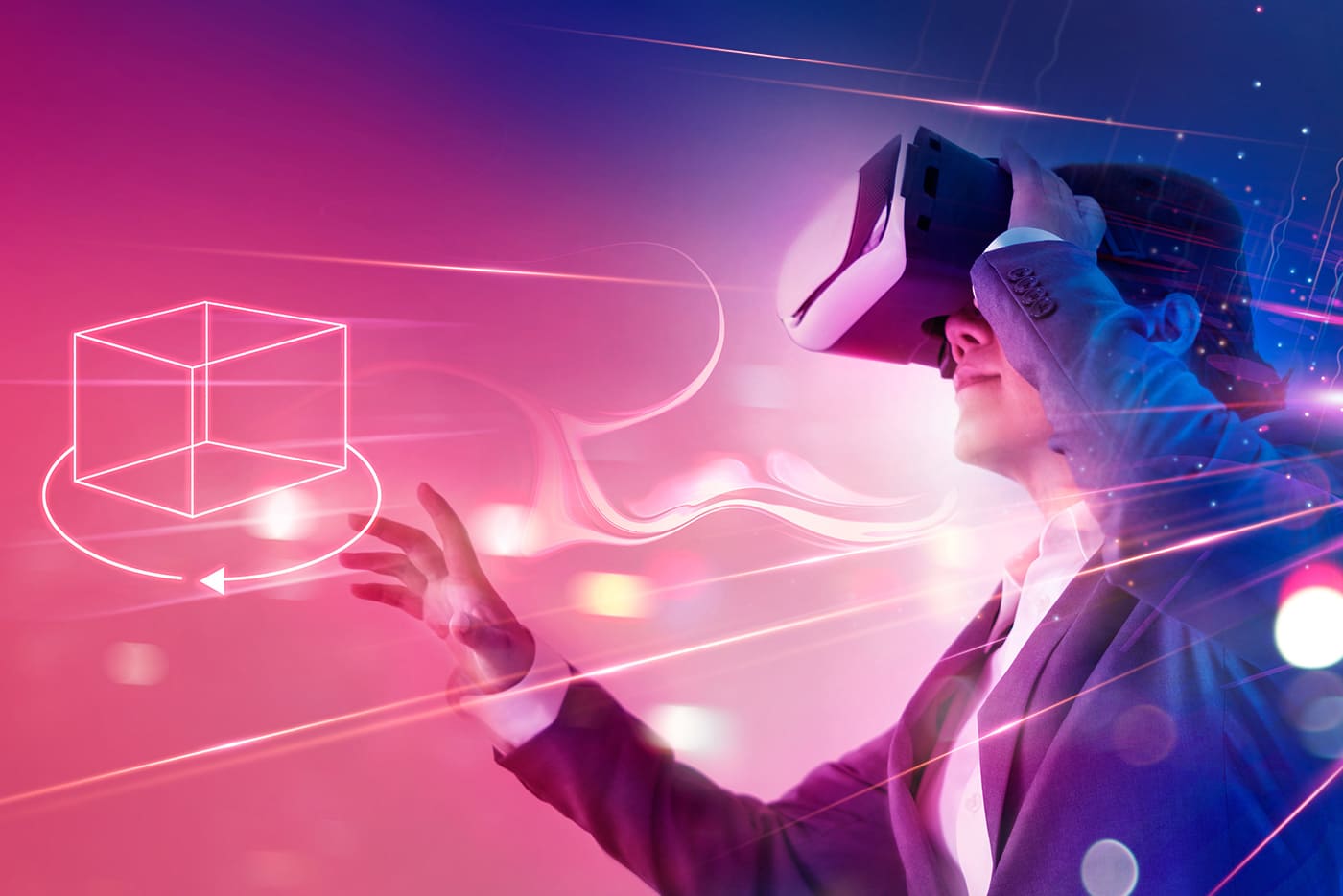Metaverse Continuum: 4 Technology Trends Everyone Must Get Ready For Now
11 April 2022
Technologists at Accenture have unveiled their Tech Vision 2022 “metaverse continuum” – an overview that lays out how they believe businesses and individuals will interact across interconnected digital environments and services in the near future.

The document – titled ‘Meet Me In The Metaverse’ – also highlights the four key technology trends they believe will impact our lives in 2022. It comes as the company announces the formation of a new business unit that will focus on making the metaverse work for its customers.
The four trends identified in the report are:
- WebMe – Putting the "me" in metaverse
- Programmable world – our planet, personalized
- The unreal: Making the synthetic, authentic
- Computing the impossible: New machines, new possibilities
I got the chance to speak to one of the report’s authors – Paul Daugherty, who is Accenture’s Group Chief Executive for Technology.
He explained to me that the word “continuum” was chosen as it represents the form that they believe the metaverse will take. That is, a "spectrum of digitally enhanced worlds, realities, and business models."
All four of the trends touch on elements that will make up the metaverse, so together with Daugherty, I took a closer look at them all individually.
WebMe
This encapsulates several ideas connected with the concept of identity in the digital domain and in the immersive digital realities that will one day become the metaverse. These ideas include the concept of “presence” – that we will have the experience of being present, through avatars or other representations of ourself, within the domain, rather than just observing it, as we do today when we browse a web page or use an app. It also illustrates the idea that our data will be portable between different domains or areas of the metaverse, and our sense of identity and digital presence will move with it. This works towards creating the far more immersive experience that we believe will be a defining characteristic of the "metaverse experience."
Daugherty says that two important concepts that will emerge from this are the "Internet of place" and "Internet of ownership."
He states, “It’s the shared collaborative spaces and experiences that you can have … things like Microsoft Mesh and Omniverse from Nvidia… that’s the internet of place.
“Then there’s the internet of ownership which is really foundational – new forms of identity, and establishing unique identities for people and objects in the internet … it’s what enables cryptocurrency and enables new forms of commerce … things like fungible and non-fungible tokens and new products you can have on the internet, and this really is a gamechanger from a business perspective.”
The Programmable World
As the world becomes increasingly virtual, digitized, and computerized, our ability to control and manipulate it increases. Think about how just a generation or so back, cars were entirely mechanical, and if anything went wrong with them, or we needed to alter aspects of their performance, we would need to alter the physical mechanisms such as the engine, brakes or gearboxes. Today we can plug them into a computer and diagnose faults as well as fine-tune every aspect of their performance. This already goes way beyond cars, with computers and microchips found in every device from kettles to bathroom scales. Medicines and vaccines can be programmed to target specific diseases or to be effective in people with a particular genetic disposition. And materials themselves are becoming “intelligent” – such as concrete that can self-repair when it becomes cracked, at car tires that adapt the composition of their rubber treads to fit the driving behavior of their users and the terrain where they are used.
Daugherty tells me, "All those things are becoming reality, and it really extends what businesses can do and has a lot of benefits including sustainability … you can think about new ways to conceptualize and build products … things like this are really about how the whole world becomes programmable and the digital technology … is really going to change the whole world, not just the way that technology is used in companies.”
The Unreal
Synthetic data is any data that is generated by computers rather than captured from the real world. In particular, it is created using artificial intelligence (AI) algorithms and digital twins that are able to model real-world objects, systems, and processes with increasing accuracy and therefore create data that has all of the value of real-world data. In these situations, the important distinctions become less about what is "real" or "unreal" and more about whether the data is realistic or not realistic – or authentic or inauthentic. The technology known as “deep fakes” has made news headlines often for the wrong reasons in recent years, but it also has very positive potential uses where it can save companies time and money by creating synthetic content which, though not “real”, can still be considered authentic.
Daugherty says, "As always, this is about getting the balance right and looking at the opportunities to do it well, as well as the responsibility of avoiding the pitfalls – a lot of work is going on around authenticity … lots of work with generative neural networks that will hopefully give us some technological solutions as well.”
Here, the Accenture report makes the very important point that trust and sustainability are two issues that cannot be overlooked when it comes to the impact of this technology. Businesses and brands will have the challenge of developing bonds of trust with customers in digital worlds where anything can be faked, and authenticity is paramount. At the same time, a major hurdle will be demonstrating that all of these systems and the energy used to power them are being built and developed in a sustainable way.
"There are solutions, and it's incumbent on us to understand this and navigate the future in the right way," Daugherty says.
Computing the impossible
Computing power has always been increasing. But new developments on the horizon like quantum computing and biocomputing are set to blow Moore’s Law – the observation made in 1965 that computers tend to roughly double in power every two years - out of the water. The field of computing that we refer to as artificial intelligence, specifically machine learning and deep learning, has chiefly become viable in the past decade or so because computer processors have finally become available that can keep up with the background mathematics that is required. Today, Google is said to have a working quantum computer capable of operating 100 million times faster than any non-quantum computer in existence. While this will only be relevant to a very limited number of use cases (it’s unlikely you could use it to play Fortnite 100 million times faster than on an Nvidia GPU, for example), it’s clear that we're getting set for an increase in computing power, unlike anything we've seen before. Daugherty says, "New forms of computing are going to change what you're able to compute, you're going to be able to solve new problems … we’re doing work with clients in those areas looking at applying quantum algorithms to solve what would have been unsolvable problems even with high-performance computing and the cloud.
“You’re not going to replace your data center with quantum computers, but look for unsolvable and difficult-to-solve problems … that’s one place to start.”
You can catch my full conversation with Paul Daugherty, CTO of Accenture, here, where we go into more depth on Accenture’s vision for the metaverse as well as its ambitions for the newly formed Metaverse Continuum unit.
Related Articles
11 Most Reliable AI Content Detectors: Your Guide To Spotting Synthetic Media
Since the launch of ChatGPT just two years ago, the volume of synthetic – or fake – content online has increased exponentially.[...]
The AI-Powered Citizen Revolution: How Every Employee Is Becoming A Technology Creator
Something remarkable is happening in organizations around the world.[...]
6 Mistakes IT Teams Are Guaranteed To Make In 2025
The next wave of artificial intelligence isn't just knocking at enterprise doors - it's exposing fundamental flaws in how organizations approach technology transformation.[...]
2025’s Tech Forecast: The Consumer Innovations That Will Matter Most
Consumer technology covers all of the tech we buy to make our lives more convenient, productive or fun.[...]
7 Healthcare Trends That Will Transform Medicine In 2025
Healthcare has evolved dramatically in recent years, with technology driving countless new opportunities, just as demographic and societal factors have created new challenges.[...]
Sign up to Stay in Touch!
Bernard Marr is a world-renowned futurist, influencer and thought leader in the fields of business and technology, with a passion for using technology for the good of humanity.
He is a best-selling author of over 20 books, writes a regular column for Forbes and advises and coaches many of the world’s best-known organisations.
He has a combined following of 4 million people across his social media channels and newsletters and was ranked by LinkedIn as one of the top 5 business influencers in the world.
Bernard’s latest book is ‘Generative AI in Practice’.










Social Media